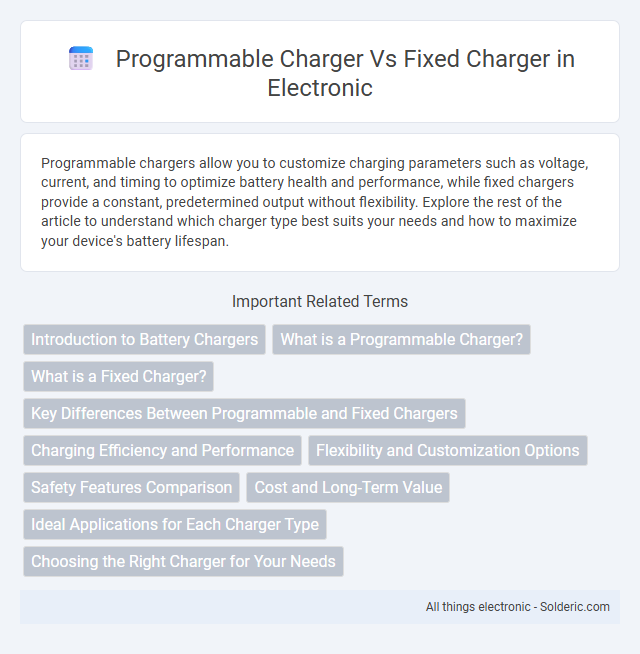Programmable chargers allow you to customize charging parameters such as voltage, current, and timing to optimize battery health and performance, while fixed chargers provide a constant, predetermined output without flexibility. Explore the rest of the article to understand which charger type best suits your needs and how to maximize your device's battery lifespan.
Comparison Table
| Feature | Programmable Charger | Fixed Charger |
|---|---|---|
| Charging Control | Customizable settings for voltage, current, and timing | Pre-set voltage and current, no adjustments |
| Flexibility | Supports multiple battery types and charging profiles | Designed for specific battery type or fixed parameters |
| User Interface | Digital display with programmable options | Simple interface, often LED indicators |
| Application | Ideal for testing, development, and variable usage | Best for consistent, repetitive charging tasks |
| Cost | Higher due to advanced features | Lower, budget-friendly |
| Safety Features | Enhanced protections via adjustable limits | Basic safety controls |
| Maintenance | Requires occasional calibration and updates | Minimal maintenance |
Introduction to Battery Chargers
Programmable chargers offer customizable charging profiles tailored to specific battery chemistries and capacities, optimizing battery health and lifespan through precise voltage and current control. Fixed chargers provide a constant, unmodifiable output suited for standard batteries but may risk overcharging or undercharging sensitive cells. Choosing between programmable and fixed chargers depends on the battery type, required charging accuracy, and application, with programmable options preferred for advanced or high-value batteries.
What is a Programmable Charger?
A programmable charger allows you to customize charging parameters such as voltage, current, and timing to match the specific needs of your battery, enhancing safety and efficiency. Unlike fixed chargers, which operate at predetermined settings, programmable chargers provide flexibility to optimize battery life and performance for various applications. This adaptability makes programmable chargers ideal for sensitive or specialized battery types where precise control is essential.
What is a Fixed Charger?
A fixed charger is a charging device designed with preset voltage and current levels that cannot be adjusted by the user, ensuring consistent and reliable charging performance for specific battery types. It typically offers simple operation and durability, making it suitable for applications where standardized charging is essential, such as consumer electronics and industrial equipment. Unlike programmable chargers, fixed chargers lack customization options but provide cost-effective and maintenance-free solutions.
Key Differences Between Programmable and Fixed Chargers
Programmable chargers allow users to customize voltage, current, and charging time parameters for specific battery requirements, enhancing battery lifespan and efficiency. Fixed chargers operate with preset values and limited adjustability, providing simplicity and reliability for standard charging needs. The flexibility of programmable chargers suits diverse batteries, while fixed chargers offer ease of use and cost-effectiveness.
Charging Efficiency and Performance
Programmable chargers optimize charging efficiency by adjusting voltage and current based on battery condition, enhancing battery lifespan and reducing energy waste. Fixed chargers deliver constant power regardless of battery status, often leading to overcharging or undercharging, which diminishes performance over time. Choosing a programmable charger ensures your device receives tailored charging for maximum efficiency and prolonged battery health.
Flexibility and Customization Options
Programmable chargers offer enhanced flexibility and customization options by allowing users to set specific charging parameters such as current, voltage, and charging time tailored to different battery types and conditions. Fixed chargers provide a one-size-fits-all solution with predetermined settings, limiting adaptability for varied devices or battery chemistries. This programmability ensures optimal battery health and efficiency, particularly important for sensitive or high-performance batteries.
Safety Features Comparison
Programmable chargers offer advanced safety features such as customizable voltage and current limits, overcharge protection, and temperature monitoring, allowing precise control to prevent battery damage. Fixed chargers typically provide basic safety mechanisms like automatic shut-off and short-circuit protection but lack the adaptability to varied battery requirements. The enhanced safety customization in programmable chargers significantly reduces risks of overheating, overcharging, and potential battery failure compared to fixed chargers.
Cost and Long-Term Value
Programmable chargers typically have a higher upfront cost compared to fixed chargers due to their advanced features and customization options. However, their ability to optimize charging cycles can extend battery life and reduce energy consumption, offering better long-term value. Investing in a programmable charger can save you money over time by minimizing replacement costs and improving overall efficiency.
Ideal Applications for Each Charger Type
Programmable chargers are ideal for applications requiring customized charging profiles, such as in medical devices, electric vehicles, and industrial battery systems, where precise control over voltage and current enhances battery lifespan and performance. Fixed chargers suit simpler applications like consumer electronics and household gadgets, providing reliable, consistent charging without the need for user adjustments. Your selection depends on whether your device benefits from tailored charging parameters or requires straightforward, maintenance-free power replenishment.
Choosing the Right Charger for Your Needs
Selecting the right charger depends on your device's compatibility and charging requirements. Programmable chargers offer customizable voltage and current settings, ideal for specialized electronics or projects needing precise power control. Fixed chargers provide consistent output and simplicity, best suited for everyday devices requiring standard charging parameters.
Programmable charger vs fixed charger Infographic

 solderic.com
solderic.com